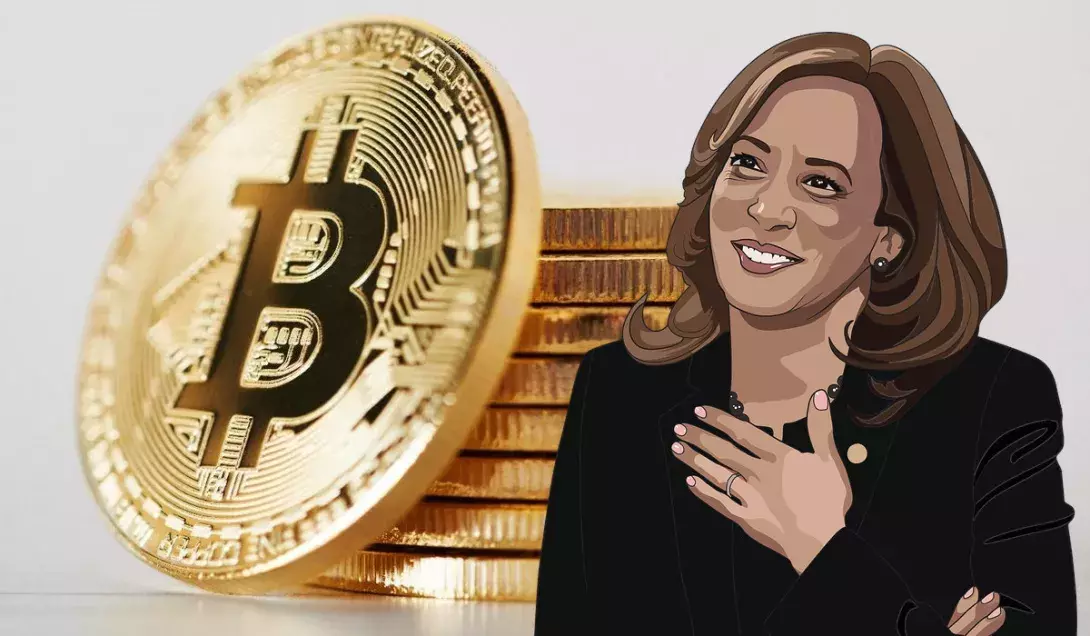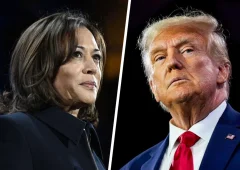Kamala Harris Signals Strong Support for Crypto in Bold Economic Strategy
23.09.2024 8:00 1 min. read Alexander Stefanov
Vice President Kamala Harris, the Democratic candidate for the upcoming presidential election in November, recently spoke at a Wall Street fundraiser where she addressed the cryptocurrency industry for the first time.
She incorporated AI and digital assets into her vision of an ‘opportunity economy.’
Harris shared her plan to foster this economy by uniting labor, small businesses, entrepreneurs, and large corporations. Her goal is to boost U.S. competitiveness by supporting technologies like AI and crypto, while ensuring safeguards for consumers and investors. “We will create a business environment with transparent and consistent regulations,” she said, according to a Bloomberg reporter.
The Manhattan fundraiser, described as Harris’ last public appearance in New York before the election, had ticket prices ranging from $500 to $1 million. Celebrities such as Anne Hathaway, Whoopi Goldberg, and Billy Porter were among those in attendance.
Reuters reported that Harris intends to unveil new economic policies aimed at wealth-building and offering incentives to businesses, though further details remain limited.
Following a recent debate against former President Donald Trump, Harris’ odds have risen in several key swing states, with prediction markets giving her a 52% chance of victory over Trump’s 47%. Meanwhile, Trump has continued his outreach to the crypto community, making appearances at New York’s Bitcoin-themed bar PubKey and promoting his family’s World Liberty Financial project, which has received mixed reactions from the industry.
-
1
FTX Pushes to Dismiss Billion-Dollar Claim from 3AC
23.06.2025 15:00 1 min. read -
2
BIS Slams Stablecoins, Calls Them Ill-Suited for Modern Monetary Systems
26.06.2025 9:00 1 min. read -
3
ARK Invest Cashes In on Circle Rally as Stock Soars Past $60B Valuation
24.06.2025 19:00 1 min. read -
4
Trump’s ‘Big, Beautiful Bill’ Approved: What It Means for Crypto Markets
04.07.2025 7:00 3 min. read -
5
FTX Pushes Back Against $1.5B Claim From Defunct Hedge Fund 3AC
23.06.2025 11:00 1 min. read
Top 10 Biggest Crypto Developments This Week
The latest WuBlockchain Weekly report captures a high-volatility week in crypto. From Bitcoin’s new all-time high to controversy around Pump.fun’s presale and Elon Musk’s political Bitcoin endorsement, markets are witnessing sharp shifts in momentum and policy.
Federal Reserve Chair Jerome Powell Reportedly Weighing Resignation
U.S. financial circles are bracing for a potential shake-up as reports suggest Federal Reserve Chair Jerome Powell is considering stepping down.
Peter Schiff Warns of Dollar Collapse, Questions Bitcoin Scarcity Model
Gold advocate Peter Schiff issued a stark warning on monetary policy and sparked fresh debate about Bitcoin’s perceived scarcity. In a pair of high-profile posts on July 12, Schiff criticized the current Fed rate stance and challenged the logic behind Bitcoin’s 21 million supply cap.
Report Claims That Binance Played a Foundational Role in the Creation of Trump Related StableCoin
Changpeng Zhao, the former CEO of Binance, reportedly supported crypto projects linked to the Trump family while privately seeking a presidential pardon, according to a July 11 report by Bloomberg News.
-
1
FTX Pushes to Dismiss Billion-Dollar Claim from 3AC
23.06.2025 15:00 1 min. read -
2
BIS Slams Stablecoins, Calls Them Ill-Suited for Modern Monetary Systems
26.06.2025 9:00 1 min. read -
3
ARK Invest Cashes In on Circle Rally as Stock Soars Past $60B Valuation
24.06.2025 19:00 1 min. read -
4
Trump’s ‘Big, Beautiful Bill’ Approved: What It Means for Crypto Markets
04.07.2025 7:00 3 min. read -
5
FTX Pushes Back Against $1.5B Claim From Defunct Hedge Fund 3AC
23.06.2025 11:00 1 min. read


